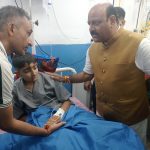Ganderbal, Sep 10: A significant milestone in the revitalization of the horticultural sector in Jammu and Kashmir was achieved when a distinguished team of experts from the World Bank paid their inaugural visit to the Grape Village Repora.
The visit coincided with the celebration of “Grape Day” by the Krishi Vigyan Kendra (KVK) Ganderbal, showcasing the collaborative efforts to bolster grape cultivation in the region.
Led by Dr. Ishfaq Abidi, Senior Scientist and Head of KVK Ganderbal, the experts received a warm welcome from the community, including Professor J.N Khan College of Agriculture Engineering and officers from the Horticulture Department. Dr. Abidi, in his briefing to the delegation, underscored the significance of Repora A and Repora B as niche grape villages in the Kashmir Valley.
He highlighted the dedicated efforts of SKUAST-K and KVK Ganderbal over the past three years to reignite interest among farmers through technological interventions. These interventions included management capsules and on-farm trials (OFTs), which played a pivotal role in helping farmers combat major grape diseases such as Anthracnose, Bunch rot, Downy and Powdery mildews, and Hen & Chick disorder.
Dr. Abidi emphasized the pivotal role of grapes as a cash crop for Ganderbal district and offered guidance on best practices for export-oriented grape production. Dr. Arvind Jhamb, Advisor to the World Bank and the chief guest of the event, lauded the KVK scientists for their dedication to disseminating knowledge to farmers. He engaged in direct interactions with farmers to gain firsthand insights into their challenges in grape production.
Dr. Jhamb emphasized the immense potential of Village Repora to become a prominent grape cluster in the country due to its unique advantages and high-quality grape production. He stressed the need for farmers to follow the advice of scientists to unlock this potential. During the discussions, ideas were exchanged on transforming the area into a model grape village through strategies like area expansion, nutrient and water management, the use of ICTs, hail nets, and post-harvest management.
Furthermore, Dr. Jhamb announced plans to develop a value chain in the Ganderbal grape industry, with KVK scientists preparing a concept paper for financial support. He inspired local farmers to draw inspiration from the success stories of their counterparts in Maharashtra, who have greatly increased their benefits by establishing Farmer Producer Organizations (FPOs).
Local farmers expressed their gratitude for the visit of the World Bank experts and the efforts of KVK Ganderbal, SKUAST-Kashmir, and other stakeholders in the revival of grape cultivation in Repora A and B. They also expressed a keen interest in adopting a horticulture-poultry model in grape fields and pledged to diligently follow the advice provided by SKUAST-K.
The program was attended by KVK staff, officers from various line departments, and other dignitaries.
The World Bank team, led by Arvind Jhamb, World Bank Consultant, and Bekzod Shamsiev, Senior Agriculture Economist, is currently on a two-day visit to SKUAST-K to review activities under the World Bank-ICAR funded NAHEP initiative. The primary objective of their visit is to explore the development potential of horticulture and other agricultural sectors in the Union Territory of Jammu and Kashmir.









